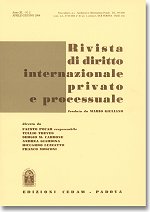Antonio Leandro, the author of this post, teaches International Law at the University of Bari.
On 20 May 2015 the European Parliament approved the new European Insolvency Regulation (EIR) in the text adopted by the Council at first reading on 12 March (publication on the Official Journal is expected to follow soon). This marks the end of a revision process which started with the Commission proposal of 12 December 2012 (COM/2012/744 final).
The primary aim of the revision was to improve the operation of the EIR with a view to ensuring a smooth functioning of the internal market and its resilience in economic crises, having regard to national insolvency laws and to the case law of the ECJ on the “old” Insolvency Regulation, i.e. Regulation No 1346/2000 (the relevant ECJ judgments include: Susanne Staubitz-Schreiber [2006]; Eurofood IFSC [2006]; Deko Marty Belgium [2009]; SCT Industri [2009]; German Graphics [2009]; MG Probud [2010]; Interedil [2011]; Zaza Retail [2011]; Rastelli Davide [2011]; F-Tex SIA [2012]; ERSTE Bank Hungary [2012]; Ulf Kazimierz Radziejewski [2012]; Bank Handlowy [2012]; Grontimmo [2013]; Meliha Veli Mustafa [2013]; Ralph Schmid [2014]; Burgo Group [2014]; Nickel & Goeldner Spedition [2014]; H [2014]).
In short, the revised text: (a) extends the EIR’s scope to proceedings aimed at giving the debtor a “second chance”; (b) strengthens the current jurisdictional framework in terms of certainty and clarity; (c) improves the coordination among insolvency proceedings opened in respect of the same debtor and strikes a better balance between efficient insolvency administration and protection of local creditors; (d) reinforces the publicity of the proceedings by compelling Member States to provide for insolvency registers and by providing for the interconnection of national registers; (e) deals with the management of multiple insolvency proceedings relating to groups of companies.
The new EIR will enter into force following its publication in the Official Journal, but the bulk of its provisions will only apply in 2017.
A broader scope
Opening the EIR to collective rescue and restructuring proceedings, to proceedings which leave the debtor fully or partially in control of its assets and affairs and to proceedings providing for a debt discharge or a debt adjustment in relation to consumers and self-employed persons as well as to interim proceedings, means that the appointment of a “liquidator” and the debtor’s divestment are no more grounds of the EIR’s applicability.
The difference between “all-creditors-including” and “not-all-creditors-including” proceedings has been implicitly upheld. However, Recital 14 clarifies that proceedings not including all the creditors should be proceedings aimed at rescuing the debtor, while those leading to a definitive cessation of the debtor’s activities or to the liquidation of the debtor’s assets should include all the creditors.
Annex A lists the proceedings at stake: national insolvency procedures not listed fall out of the scope of the Regulation. In doing so, Annex A provides – as the ECJ held in Ulf Kazimierz Radziejewski (§§ 23-24) and Meliha Veli Mustafa (§ 36) – a clear-cut confine of the EIR’s scope.
Moreover, the extension to proceedings whose purpose is not liquidation has led to replacing the term “liquidator” with “insolvency practitioner”, so as to include a broader range of tasks in connection with the administration of the debtor’s affairs. Annex B lists the relevant insolvency practitioners based on national laws.
Hereinafter, we will refer to the insolvency practitioner appointed in the main proceedings as the “main insolvency practitioner” and to the one appointed in secondary proceedings as the “secondary insolvency practitioner”.
The innovations regarding jurisdiction
Some Recitals inspired by Eurofood and Interedil have been inserted in the new EIR to clarify the concept of “centre of main interests” (COMI).
It is now stated that the COMI of individuals is to be found – presumptively – in their “principal place of business”, if they are independent businessmen or professional providers, or in their habitual residence, in all other cases (Article 3(1)).
In order to avoid fraudulent or abusive forum shopping practices, these presumptions will only apply if the registered office/principal place of business/habitual residence have not been transferred to another Member State within a given period prior to the request for the opening of the insolvency proceedings.
The court requested to open the proceedings will rule on jurisdiction of its own motion, and specify in the judgment on which ground it retained jurisdiction (Article 4).
Vis attractiva over “ancillary” proceedings is now codified in Article 6. Moreover, should the “ancillary” action be related with another action based on civil and commercial law, then the insolvency practitioner is entitled to bring both claims in the court of the defendant’s domicile or, in the case of several defendants, in the court of the Member State where any of them is domiciled, provided that such court has jurisdiction under the Brussels I Regulation (recast).
Coordination of proceedings
The new EIR improves the coordination among insolvency proceedings opened against the same debtor, and attempts to strike a better balance between efficient insolvency administration and protection of local creditors.
In particular, it makes the opening of secondary proceedings conditional upon both the interests of local creditors and the objectives of the main proceedings, and accordingly, strengthens the main insolvency practitioner’s role in this regard.
The court of the establishment will be enabled, on request of the main insolvency practitioner, to refuse or to postpone the opening of secondary proceedings whenever this is not necessary to protect the interest of local creditors.
When ruling on a request for opening brought by local creditors, the court of the establishment should give the main insolvency practitioner the opportunity to be heard before deciding (Article 38). The main insolvency practitioner will have the opportunity to apply for refusal or postponement of the opening of secondary proceedings, while the court of the establishment will be in a position to be aware of any rescue or reorganization options explored by the main insolvency practitioner, so as to properly assess the consequences of the opening.
Based on these and other elements, the court may refuse the opening or opt for proceedings not involving the winding-up of the debtor. This differs from the current regime, which allows for the alternative proceedings option only for territorial proceedings, i.e. prior to the opening of main proceedings.
In line with this new broadened role in evaluating the impact of secondary proceedings upon the centralized rescue or the estate administration, the main insolvency practitioner will be entitled to challenge the decision whereby secondary proceedings are opened.
As regards the protection of local creditors, in order to avoid the opening of secondary proceedings, the main insolvency practitioner may undertake within the main proceedings, in respect of assets located in the Member State of the establishment, ‘that he will comply with the distribution and priority rights under national law that [they] would have if secondary proceedings were opened’ (Article 36(1)). This undertaking should remove the local creditors’ concern over seeing themselves deprived of interests and preferential rights based on the local lex concursus by the opening of the sole main proceedings and by the applicability of the COMI’s lex concursus. At the same time, it will avoid the opening of secondary proceedings that may adversely affect the outcome of the main insolvency proceedings, in particular where the latter are aimed at rescue and restructuring.
In this respect, the new EIR draws inspiration from the “synthetic secondary proceedings”.
If secondary proceedings are opened or the request of opening is still pending, the new EIR extends the duty to cooperate both to the courts involved and between courts and insolvency practitioners (Articles 41-43).
Courts and insolvency practitioners are also required to take account of principles and guidelines adopted by European and international organizations active in the area of insolvency law, including the UNCITRAL guidelines (Recital 48). For instance, the courts may coordinate with each other to appoint the insolvency practitioners, while courts and insolvency practitioners may enter into protocols and agreements to facilitate cross-border cooperation and to coordinate the administration and supervision of the debtor’s assets and affairs.
Publishing insolvency information
Member States are required to establish publicly accessible electronic registers that contain information on cross-border cases (Article 24). All national registers will be interconnected with each other through the European e-Justice portal (Article 25).
This mandatory regime is meant to safeguard the foreign creditors’ right to lodge claims and prevent the opening of parallel proceedings. As for the foreign creditors – i.e. those having their habitual residence, domicile or registered office in a Member State other than the State of the proceedings, including the tax authorities and social security authorities of Member States: Article 2(12) –, their right to lodge claims will be facilitated by using a standard form to be established in an implementing act of the Commission.
Certain protective rules concerning the personal data have been inserted on account of the fact that, as noted above, the new Regulation will also apply to proceedings opened against persons who do not carry out an independent business or professional activity: see Articles 78-83. Having these cases in mind, Recital 80 strikes a balance with the creditors’ right to lodge the claims by calling Member States to ensure both that the relevant information is given to creditors by individual notice and that claims of creditors who have not received the information are not affected by the proceedings.
Groups of companies
The revision also addresses the management of multiple insolvency proceedings relating to groups of companies, introducing a specific Chapter (V). This strives to ensure the efficiency of the insolvency administration, whilst respecting each group member’s separate legal personality.
In this regard, the new EIR draws inspiration from the UNCITRAL Model Law and related Legislative and Practice Guides.
Firstly, should more proceedings be opened in different Member States, the new EIR requires all the actors involved (insolvency practitioners and courts) to comply with the duties of cooperation and communication applicable when main and secondary insolvency proceedings are opened against the same debtor (Chapter V, Section 1).
An important innovation is that an insolvency practitioner is now allowed to request the opening of a “group coordination proceeding”, which should further facilitate, in particular, the restructuring of groups (Chapter V, Section 2). The participation of the other insolvency practitioners (hence, the other proceedings) rests on a voluntary basis.
A “coordinator” will be appointed to propose and implement the coordination plan (Articles 71-72).
All the advantages of the “coordination proceedings” should be worth the costs. In other words, the costs of the coordination should be sustainable and adequate having regard to the purpose of each proceedings involved.
The introduction of groups-of-companies oriented rules will not prevent a court from opening insolvency proceedings for several companies in a single State if the court finds a common COMI therein (Recital 53).
What about the applicable law?
The revision only marginally addresses the issue of applicable law.
However, Article 11(2) and Article 13(2) of the new texts are noteworthy in this respect, in that they manage, as regards contracts relating to immovable property and contracts of employment, the effects of the insolvency stemming from the (local) lex contractus when the insolvency being handled abroad in the main proceedings.
Article 18 extends to pending arbitration proceedings the existing rule whereby the effects of insolvency proceedings on a pending lawsuit concerning assets or rights included in the debtor’s insolvency estate must be governed by the law of the Member State where the lawsuit is pending (the law of the seat of the arbitration will apply).
Finally, all the rules whose functioning depends on the concept of “Member State in which assets are situated” will benefit from the broader and more detailed definition provided by Article 2(9), which refers, among other “assets”, to registered shares in companies, financial instruments, cash held in credit institutions accounts and copyrights.


